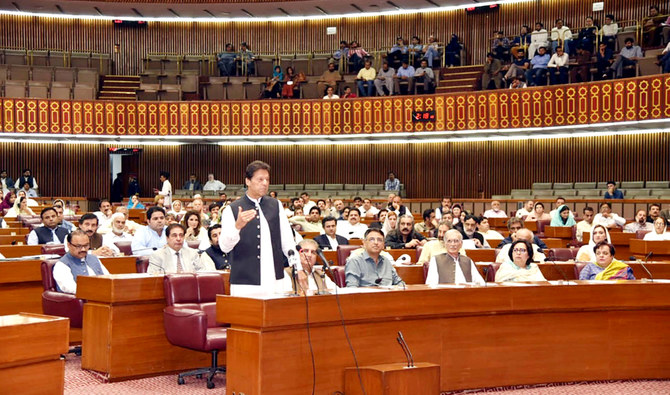KARACHI: Pakistan has prequalified four investors for the sale of Pakistan International Airlines (PIA), while its Cabinet Committee on Privatization (CCOP) has approved the transaction structure for the denationalization of the Roosevelt Hotel in New York under a joint venture, the ministry of privatization said on Tuesday.
Pakistan has been seeking to sell a 51-100 percent stake in the struggling national airline to raise funds and reform cash-draining, state-owned enterprises as envisaged under a $7 billion International Monetary Fund program. It would be the country’s first major privatization in nearly two decades.
Among the bidding groups, one is a consortium of major industrial firms Lucky Cement, Hub Power Holdings, Kohat Cement and Metro Ventures. Another is led by investment firm Arif Habib Corp. and includes fertilizer producer Fatima Fertilizer, private education operator The City School, and real estate firm Lake City Holdings. Additionally, Fauji Fertilizer Company, a military-backed conglomerate, and Pakistani airline Airblue, have been approved to bid for PIA.
“The prequalified parties will now proceed to the buy-side due diligence phase — a critical next step in the transparent and competitive privatization process of PIACL,” the privatization commission’s statement said.
PIA, once a respected carrier in Asia, has been propped up by taxpayers for decades due to political interference, corruption and inefficiencies. The airline’s privatization has repeatedly collapsed amid union resistance, legal hurdles and low investor appetite.
Pakistani state-owned enterprises post annual losses of more than Rs800 billion ($2.87 billion), and when subsidies, grants and other support are included, the burden swells beyond Rs1 trillion ($3.59 billion), Finance Minister Muhammad Aurangzeb told parliament while presenting the budget for fiscal year 2025–26 earlier this month.
PIA has been one of the government’s most costly liabilities, which has accumulated over $2.5 billion in losses in roughly a decade and been surviving on repeated bailouts that have weighed heavily on Pakistan’s strained budget.
Last month, five consortiums submitted expressions of interest for a 51–100 percent stake in PIA after the government restructured its balance sheet to make the deal more attractive. It also scrapped the sales tax on leased aircraft and is providing limited protection from legal and tax claims. Around 80 percent of the airline’s debt has been transferred to the state.
ROOSEVELT HOTEL
Separately, the CCOP approved the transaction structure for Roosevelt Hotel under a “Joint Venture model with multiple options.”
“This option is aimed at maximizing long-term value for the country, while ensuring flexibility, multiple exit opportunities, and minimizing future fiscal exposure,” the privatization commission said.
How much money the hotel ultimately brings in, and its overall valuation, depends on the type of transaction structure adopted, Privatization Commission Chairman Muhammad Ali told Arab News in an interview last month. If the government formed a joint venture with a private investor, sharing both the risks and future profits, the hotel could be worth four to five times more than its as-is valuation, he said at the time.
“So, depending on what sort of structure you have, how much risk you take, how much effort the government puts in, we can make a lot of money from this asset,” the privatization chief had said.
The Roosevelt, a 1,015-room historic hotel in Midtown Manhattan, has long been one of Pakistan’s most prominent but politically sensitive overseas assets. Acquired by Pakistan International Airlines Investment Limited (PIAIL) in 1979, the hotel occupies a full city block on Madison Avenue and 45th Street. Over the past two decades, successive Pakistani governments have floated plans to sell, lease, or redevelop the property, but no proposal has advanced beyond early-stage planning.
Operations at the Roosevelt were suspended in 2020 following steep financial losses during the COVID-19 pandemic. In 2023, Pakistan entered a short-term lease with the City of New York to use the property as a temporary shelter for asylum seekers, generating more than $220 million in projected rental income. That agreement ended in 2024 and no new revenue stream has since been announced.
The Roosevelt Hotel is one of several state assets the government hopes will contribute to its target of raising Rs86 billion ($306 million) in privatization proceeds during the fiscal year starting July 1, alongside the sale of PIA and three electricity distribution companies.
















